Ten steps that saw bear bile farming go from dark secret to international outrage
27 November 2014
When Animals Asia started in 1998, bear bile farming was little known internationally and little more than a dark secret in China. Today it is one of the most debated topics on Chinese social media and commands headlines across the world.
1/ In 1998, Animals Asia opens
Animals Asia, dedicated to the eradication of bear bile farming, was established by Jill Robinson in 1998. Five years earlier she had vowed to take on the bear bile industry after she first witnessed the horror of bear bile farming.
2/ In 2000, an agreement is reached with the Chinese government to build a sanctuary
Animals Asia signs a landmark agreement with the Chinese government to build a bear sanctuary in Chengdu. The first 60 bears arrive that year. Moon bear Andrew becomes the sanctuary's very first resident.
3/ In 2004, Asian superstar Karen Mok joins the fight
Chinese public awareness received a major boost when superstar, actress and singer Karen Mok joined Animals Asia's campaign against bear bile farming. Karen is so influential that, four years later, she would carry a torch at the Beijing Olympics.
4/ In 2007, Animals Asia's efforts to end bear bile farming expand to Vietnam
Bear bile farming became officially illegal in Vietnam in 2005, prompting Animals Asia to begin construction of the Vietnam Bear Rescue Centre in 2007. The first residents arrived in the same year, when tiny cubs Olly, Mara and Mausi made themselves at home.
5/ In 2007, Chinese government support for ending the industry starts to build
National People's Congress (NPC) member, Zhou Ping, files a proposal to end bear bile farming. Three years later she is joined by fellow NPC members and Chinese People's Political Consultative Conference (CPPCC) delegates. They, and increasingly more NPC and CCPPC members, have continued to offer annual support in every national session since.
6/ In 2008, evidence of damage bile farming causes to bears is published
Clear evidence of the damage to bears of bile farming and its potential to be a hazard to human health, is published by noted Pathologist Dr Wang Shengxian. His findings are passed to the government and are studied by the China Wildlife Conservation Association, the Ministry of Health, the State Food and Drug Administration and the Traditional Chinese Medicine Administration Bureau.
7/ In 2011, a backlash against an industrial bear bile farm in China sees public support explode
This was the year that saw an explosion in public support for the campaign to end bear bile farming. It was caused by industrial bear bile farm Guizhengtang announcing its intention to float on the stock exchange. In the aftermath, 87 per cent of the public voiced opposition to the industry – literally hundreds of millions of Chinese people.
In one month alone, Animals Asia featured in 6,243 articles in China. Guizhengtan's floatation was ultimately unsuccessful finally being cancelled in 2013 with wildlife activists claiming an historic victory.
8/ In 2013, people power prevents eviction of the Vietnam Bear Rescue Centre
Thanks to the backing Animals Asia receives from tens of thousands of supporters across the world, the Vietnamese government eventually overturns the eviction order. Supporters stood alongside celebrities, politicians, diplomats, school children and NGOs causing the Vietnamese government to eventually rule the sanctuary can stay.
9/ In 2014, 1,945 pharmacies in China pledged not to stock bear bile products
The announcement from Animals Asia's Healing without Harm programme in September this year represented an incredible rise in the number of traditional medicine practitioners turning their backs on bear bile products. Many believe the shift is further evidence that not only are pharmacies not keen to stock the goods – their customers aren't buying them.
10/ In 2014, clear signs that the bear bile industry is crumbling
When bear bile farmer Mr Yan approached Animals Asia and said he had come to believe the industry was "cruel and hopeless" and needed to end – it was the precursor of the biggest bear rescue in history. Animals Asia started work on turning Nanning Bear Farm into its second sanctuary in China, freeing 130 bears from the horrors of bear bile farming in the process.
Meanwhile Kai Bao, the single biggest buyer of bear bile in China – accounting for half of all bear bile sold – announced it would be pursuing synthetic alternatives with the support of a government grant.
With Mr Yan claiming that the industry was already unprofitable, the possibility of a cheaper alternative prompted suggestion that bear bile prices could crash in the near future.
BACK

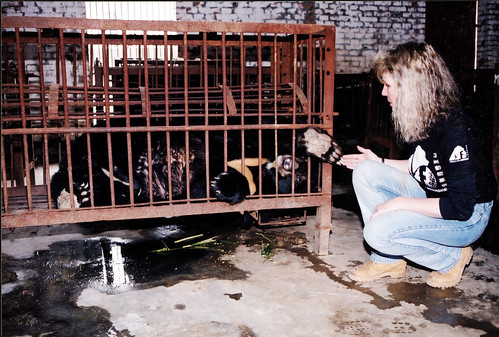
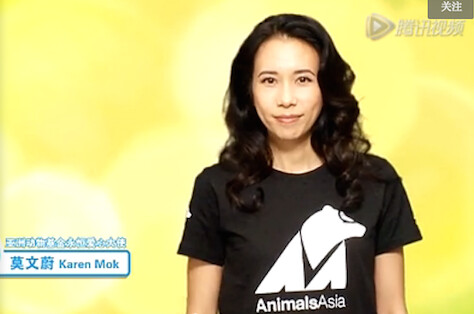

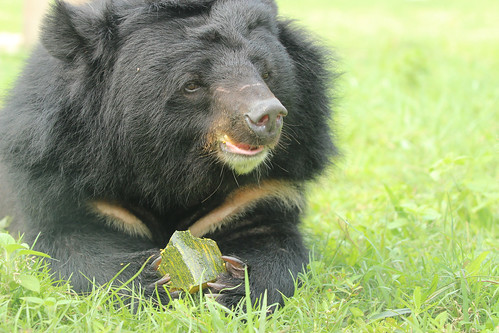
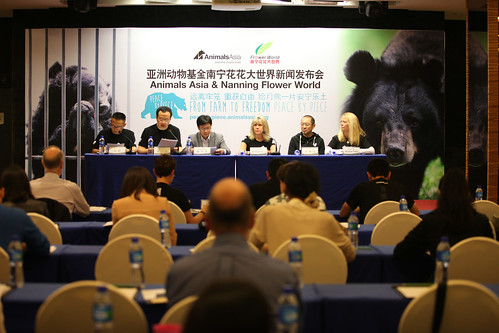




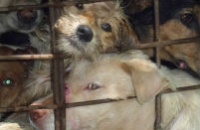 5 reasons the dog meat trade must end
5 reasons the dog meat trade must end
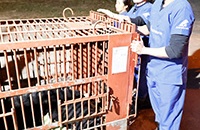 New year, new home for Christmas the Bear!
New year, new home for Christmas the Bear!
 Veterinary welfare training – pain management
Veterinary welfare training – pain management